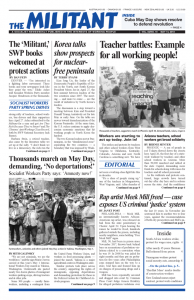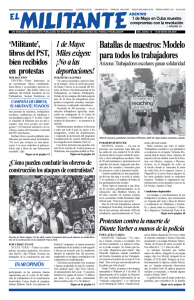Tens of thousands of workers joined in a one-day strike and protests in cities and rural areas across South Africa April 25 called by the South African Federation of Trade Unions. They demanded a significant raise in the African National Congress-led government’s proposal to set the national minimum wage at 20 rand an hour ($1.61) and opposed new legislation aimed at restricting workers’ constitutional right to strike.
The wage bill sets even lower minimum wages for farmworkers, who would receive 18 rand per hour; domestic workers, 15 rand; and those on extended public works programs, 11 rand an hour. Farmworkers and domestic workers would not get the new rates until 2020.
The proposal is being pushed by Cyril Ramaphosa, the new South African president, who says it will help reduce wage inequality. But even his official spokesman Khusela Diko admits, “The president recognizes that the national minimum wage is not a living wage.”
This was the first national strike and protest called by the South African Federation of Trade Unions, a newly formed organization with a membership of 800,000 and 30 affiliated unions. It broke away last year from the Congress of South African Trade Unions, the ANC-aligned labor federation. Cosatu and its affiliates opposed the actions.
Ramaphosa, originally trained as a lawyer, had been head of the National Union of Miners and a central leader of the ANC before he left politics in 1997 and became a wealthy business and banking magnate. He has said his goal is to make South African capitalism work.
The South African Federation of Trade Unions describes the proposed minimum wage as a “poverty wage.” It is demanding a minimum monthly pay of 12,500 rand, about $1,000, a demand first raised by platinum miners who went on strike in 2012.
“This comes from the miners at Marikana who raised this as a perfectly reasonable living wage,” Patrick Craven, national spokesperson for the union federation, said in a phone interview. He was referring to the 2012 strike by platinum miners at the Lonmin mine where 34 miners where massacred by the police. “Miners died demanding a living wage,” he added.
Ramaphosa was a company director at Lonmin when the strike and killings took place.
The city center of Johannesburg was brought to a standstill by several thousand workers in a sea of red shirts marching by government buildings. Demonstrations also took place in Cape Town, Durban, Port Elizabeth, Bloemfontein and Polokwane, as well as in rural areas. Several hundred farmworkers marched in Robertson in the Western Cape protesting the special “poverty” wage proposed for them and against conditions in the wine industry.
The strike comes as the official unemployment rate reached 27.7 percent, and nearly 6 million workers don’t have jobs. The government increased the sales tax from 14 to 15 percent, the first time it has been raised since 1993, and raised the price of fuel.
The proposed laws would mean workers would have to meet more onerous conditions before going on strike.
The bills were scheduled to be implemented by May 1, but have been sent back to the labor ministry for redrafting.

